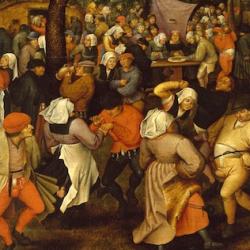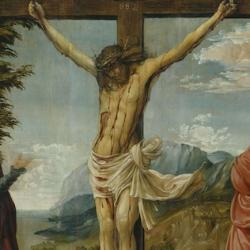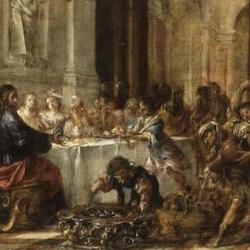INTRODUCTION
Last week, we focused attention on the role of the Spirit in the incarnation, and what the incarnation told us about the relationships among the Father, Son, and Spirit. This week, we will focus attention on the Son or Word of the Father, who was sent into the world to speak the Father to us, and to reveal to us the inner life of God.
THE TEXT
?In the beginning was the Word, and the Word was with God, and the Word was God. He was in the beginning with God. All things were made through Him, and without Him nothing was made that was made . . . .?E(John 1:1-18).
NEW CREATION
John, like Luke, teaches that the Word comes into the world in order to bring in a new creation. Like Luke also, John teaches this through including a number of allusions to the OT in his ?prologue?E(1:1-18). The clearest allusion is in the opening prepositional phrase, ?In the beginning,?Ean audible echo of Genesis 1:1. Just as God created the world ?in the beginning,?Eso He is making the world new by sending the Word that was with Him ?in the beginning.?E
There are many other echoes of Genesis 1 in John 1. In Genesis 1, Yahweh creates the world through His Word, and in John 1:3 we are told that ?all things came into being?Eby the Word.?EJohn speaks of the Word as the ?light?Ethat comes into the darkness of the world (1:4-5, 9), alluding to the creation of light on the first day of the creation week. Those who believe on His name become children of God, born not of flesh or man but of God, just as Adam was ?born?Efrom God.
John also alludes several times to passages in Exodus. He says that the Incarnate Word ?tabernacles among us?E(1:14), and that He is the place where God?s glory is visible (1:14). This refers to the glory of Yahweh that dwelt in the Mosaic tabernacle. And then John says that the Word has explicated the Father whom ?no man has seen . . . at any time?E(1:18), a reference to Yahweh?s words to Moses in Exodus 33:20 (?no man can see My face and life?E. Throughout his gospel, John fills out this picture, making it clear that Jesus fulfills all the shadows and types of Israel.
WORD MADE FLESH
But the coming of the Word is not simply a repetition of what God did in the past. This is something new, and the new thing is that the creative Word that is with God and is God has ?become flesh and tabernacled among us?E(1:14). To get the full weight of this statement, we need to understand how the word ?flesh?Eis used in Scripture. At times, it refers to man in sin and corruption (e.g., Romans 8:6-8; Galatians 5:19). But it also commonly refers to the body in the OT, and many times refers to fallen man in his weakness, frailty, and finitude. To say man is flesh is to say that he is a creature, weak and mortal (Genesis 6:3; Psalm 56:4; Isaiah 31:3; Jeremiah 17:5).
To say that the eternal Word became flesh is not, then, merely to say that the eternal Word became human. The eternal Son took on humanity in a particular mode. Jesus didn?t take a human body that glowed with a warm inner light. He took on real human flesh, but even more, as one seminary professor put it, ?dilapidated human flesh.?EJesus was not a sinner, but He came in the ?likeness of sinful flesh?E(Romans 8:3). The eternal Word by whom all things were made gave Himself over to all the weaknesses, limitations, frailties, and mortality of our present life. The Word of God enters into the depths of the muck and mess of fallen humanity in order to redeem it. The Word who is light entered the darkness so that He might shine in the darkness.
CROSS AND GLORY
The eternal Son?s entry into the weakness of ?flesh?Edid not end with the incarnation. He entered the world of ?flesh?Emost fully when He offered Himself on the cross. ?Flesh?Eis by definition ?mortal,?Esubject to death, and the Son took on real human flesh so that He could die according to the flesh. The eternal and ever-living Son died in human flesh.
For John, however, there is a paradoxical exchange here. While the Son subjects Himself to the death that all flesh is heir to, John sees this subjection not as a humiliation but as a glorification. Jesus did humble Himself to become obedient to death on a cross (Philippians 2:8), but John shows us that Jesus?Edeath is a glorification (John 3:13-15; 17:1-5). The Word?s fullest entry into flesh is at the same time a mark of His glorification. For, as Paul says, ?the foolishness of God is wiser than men, and the weakness of God is stronger than men?E(1 Corinthians 1:25).
This points to the secret of God?s inner-Trinitarian life. God did not become a giving God, a self-giving God, at the time of the incarnation. Throughout all eternity, the Son offered Himself in love to the Father in the Spirit, even as the Father gave all He had to the Son through the Spirit. The incarnation is the Son?s self-giving; but it teaches us to worship the self-giving God.
LET THIS MIND BE IN YOU
What shall we say to these things? Two obvious points emerge from these considerations. First, to quote Paul again, ?God has chosen the foolish things of the world to shame the wise, and God has chosen the weak things of the world to shame the things which are strong?E(1 Corinthians 1:27). Nothing is more offensive to our sense of human honor and dignity and fittingness than the statement, ?That baby in the manger is God incarnate.?EFor Christians, this is the glory and cunning of God, that He overcomes the proud and strong through a baby, who will grow up to die a shameful death.
Second, Paul says that we should imitate Christ?s humility in his ?self-emptying?Eon the cross (Philippians 2:5-11). The cross shows that the eternal Son was willing, eager, to enter into flesh for our sake; should we not also be willing to humble ourselves to serve others. By all means, let us celebrate Advent with gifts, drinks, good cheer. But the main way to commemorate Advent is by imitating the humiliation of the Son, the Word who became flesh.











